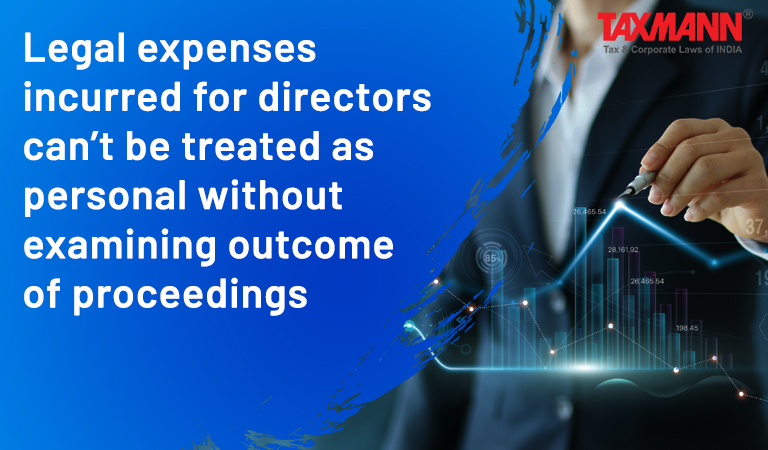Legal expenses incurred for directors can’t be treated as personal without examining outcome of proceedings
- Blog|News|Income Tax|
- 3 Min Read
- By Taxmann
- |
- Last Updated on 16 November, 2022

Case Details: Kalaignar TV (P.) Ltd. v. ACIT - [2022] 144 taxmann.com 114 (Chennai-Trib.)
Judiciary and Counsel Details
-
- V. Durga Rao, Judicial Member & G. Manjunatha, Accountant Member
- Sandeep Bagmar, Advocate for the Appellant.
- M. Swaminathan, Sr. Standing Counsel & Ms Pushpa, Jr. Standing Counsel for the Respondent.
Facts of the Case
Assessee-company claimed certain legal expenses in respect of an ongoing case at the special court. During the assessment, Assessing Officer (AO) observed that the expenses were incurred by the assessee in the cases where directors and shareholders were involved in misconduct in their individual capacities. As the expenses incurred were not exclusively for business, AO disallowed the deduction of legal expenses.
The aggrieved assessee preferred an appeal to CIT(A) which in turn upheld the order of AO and the matter reached Chennai Tribunal.
ITAT Held
The Tribunal held that the AO mainly disallowed expenditure on the ground that legal proceedings were undertaken against directors & shareholders and not against the company. In the given case, an illegal gratification of Rs. 200 crores was received by the company on account of the misdemeanors alleged to have been undertaken by the directors and shareholders.
Thus, the treatment of the reimbursement of legal and travel expenses of the directors and shareholders to pursue their case against the judicial proceedings at the special CBI Court as business expenditure by the company was in dispute.
One must look into the judgment of the special CBI court to decide whether such expenses incurred by the assessee relate to business and are eligible for claiming a deduction or not.
It should be noted that AO disallowed the legal expenses incurred for the case of the director and shareholders of the company without considering the outcome of the judgment passed by the Special Court.
AO was justified in making disallowance as the judgment of the Special Court was not available at the time of passing the assessment order. However, the same was available when the CIT(A) passed the order but it failed to consider it. Since both authorities failed to consider the judgement, the matter was remanded back to the AO for fresh consideration.
List of Cases Referred to
-
- J.B. Advani & Co. Ltd. v. CIT/CEPT [1950] 18 ITR 557 (Bom.) (para 4)
- CIT v. H. Hirjee [1951] 19 ITR 612 (Cal.) (para 4)
- CIT v. H. Hirjee [1953] 23 ITR 427 (SC) (para 4)
- J.N. Singh & Co. (P.) Ltd. v. CIT [1966] 60 ITR 732 (Punj. & Har.) (para 4)
- Hingir Rampur Coal Co. Ltd. v. CIT [1971] 81 ITR 633 (Bom.) (para 4)
- Lakshmiji Sugar Mills Co. (P.) Ltd. v. CIT [1975] 98 ITR 568 (Delhi) (para 4)
- Rohtas Industries Ltd. v. CIT [1968] 67 ITR 361 (Pat.) (para 4)
- CIT v. Birla Cotton Spg. & Wvg. Mills Ltd. [1971] 82 ITR 166 (SC) (para 4)
- CIT v. Dhanrajgirji Raja Narasingirji [1973] 91 ITR 544 (SC) (para 4)
- CIT v. Ahmedabad Controlled Iron & Steel Reg. Stockholders Association (P.) Ltd. [1975] 99 ITR 567 (Guj.) (para 4)
- Parshva Properties Ltd. v. CIT [1976] 104 ITR 631 (Cal.) (para 4)
- Atlas Cycle Industries Ltd. v. CIT [1989] 47 Taxman 244/[1990] 181 ITR 18 (Punj. & Har.) (para 4)
- Gujarat Agro Oil Enterprises Ltd. v. CIT [2002] 125 Taxman 912/256 ITR 230 (Guj.) (para 4)
- Hiranandani Akruti JV v. Dy. CIT [2017] 88 taxmann.com 209 (Mum. – Trib.) (para 4)
- CIT v. Chandulal Keshavlal & Co. [1960] 38 ITR 601 (SC) (para 4)
- Sree Meenakshi Mills Ltd. v. CIT [1967] 63 ITR 207 (SC) (para 4)
- Weavers Mills Ltd. v. Balkis Ammal AIR 1969 Mad 462 (para 4)
- McKnight (Inspector of Taxes) v. Sheppard [1999] 1 WLR 1333 (para 4)
- ICB Ltd. v. ITO [2005] 93 ITD 418 (Mum.) (para 5)
- National Refinery (P.) Ltd. v. Asstt. CIT [2020] 114 taxmann.com 614/272 Taxman 160/424 ITR 267 (Bom.) (para 5).
Disclaimer: The content/information published on the website is only for general information of the user and shall not be construed as legal advice. While the Taxmann has exercised reasonable efforts to ensure the veracity of information/content published, Taxmann shall be under no liability in any manner whatsoever for incorrect information, if any.

Taxmann Publications has a dedicated in-house Research & Editorial Team. This team consists of a team of Chartered Accountants, Company Secretaries, and Lawyers. This team works under the guidance and supervision of editor-in-chief Mr Rakesh Bhargava.
The Research and Editorial Team is responsible for developing reliable and accurate content for the readers. The team follows the six-sigma approach to achieve the benchmark of zero error in its publications and research platforms. The team ensures that the following publication guidelines are thoroughly followed while developing the content:
- The statutory material is obtained only from the authorized and reliable sources
- All the latest developments in the judicial and legislative fields are covered
- Prepare the analytical write-ups on current, controversial, and important issues to help the readers to understand the concept and its implications
- Every content published by Taxmann is complete, accurate and lucid
- All evidence-based statements are supported with proper reference to Section, Circular No., Notification No. or citations
- The golden rules of grammar, style and consistency are thoroughly followed
- Font and size that’s easy to read and remain consistent across all imprint and digital publications are applied



 CA | CS | CMA
CA | CS | CMA
